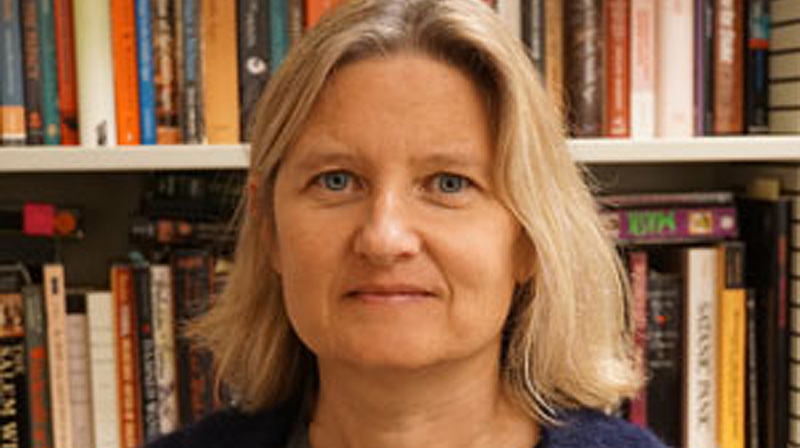Elisabeth Krimmer
Elisabeth Krimmer
Dept. of German, 411 Sproul Hall, University of California, Davis | emkrimmer@ucdavis.edu
Education
Ph.D. — University of Massachusetts at Amherst, 1994-1998 Ph.D. awarded in September 1998
Staatsexamen — für das Lehramt an Grundschulen, Ludwig-Maximilians- Universität Munich, spring 1993
Employment History
· Full Professor, University of California, Davis, fall of 2010 to present
· Chair of German and Russian, University of California, Davis, fall of 2011 to spring 2015
· Associate Professor, University of California, Davis, fall 2006 to spring 2010
· Assistant Professor, University of California, Davis, fall 2004 to spring 2006
· Visiting Assistant Professor at Georgetown University, spring 2004
· Visiting Assistant Professor at Mount Holyoke College, fall 2000 to spring 2003
· Visiting Professor at Amherst College (Five College Faculty Exchange), spring 2002
· Assistant Professor at the University of Missouri, fall 1999 to spring 2000
· Visiting Assistant Professor at Mount Holyoke College, fall 1998 to spring 1999
Grants and Prizes
· Research Grant, University of California, Davis, 2018
· Travel Grant, University of California, Davis, 2016
· National Endowment of the Humanities Fellowship, 2015-2016
· CHOICE Outstanding Academic Title award for Contemporary Hollywood Masculinities
· University of California, Davis Chancellor’s Fellow, 2009-14
· Max Kade Prize for Best Article in The German Quarterly, 2009
· Humboldt Fellowship, August 2007- July 2008
· Essay Prize of the Goethe Society of North America, 2006.
· Small Grant in Aid of Research Program, UC Davis, spring 2005 and spring 2006
· Mount Holyoke College Faculty Grant, to assist with scholarly work, 1999, 2001, 2002, 2003
· Mount Holyoke College Faculty Grant 2003, for design of a First-Year Tutorial
· Mount Holyoke College Stipend for Course Development 2002, for design of a First-Year Seminar
· Grant for design of an undergraduate seminar, University of Missouri, 1999
· Mellon Web Grant for designing a website on German Romanticism, 1998
· University of Massachusetts Graduate School Fellowship, 1996
· Graduate Student Travel Grant, University of Massachusetts, 1995
Publications
Books
1) In the Company of Men: Cross-Dressed Women around 1800. Detroit: Wayne State Press, 2004.
2) Hollywood Divas, Indie Queens, and TV Heroines: Contemporary Screen Images of Women. Co-author Susanne Kord. Lanham: Rowman & Littlefield, 2004.
3) The Representation of War in German Literature from 1800 to the Present. Cambridge: Cambridge University Press, 2010.
4) Contemporary Hollywood Masculinities: Gender, Genre and Politics. Co-author Susanne Kord. New York, Palgrave Macmillan, 2011.
5) German Life Writing and the Holocaust: Gender and Complicity in the Second World War. Cambridge: Cambridge University Press, 2018.
Edited Volumes
6) Enlightened War: Theories and Cultures of Warfare in Eighteenth Century Germany. Co-Editor: Patricia Simpson. Rochester: Camden House, 2011.
7) Religion, Reason, and Culture in the Age of Goethe. Co-editor: Patricia Simpson. Rochester: Camden House, 2013.
8) Goethe Yearbook. Vol. 21. Co-editor Adrian Daub. Rochester: Camden House, 2014.
9) Goethe Yearbook. Vol. 22. Co-editor Adrian Daub. Rochester: Camden House, 2015.
10) Goethe Yearbook. Vol. 23. Co-editor Adrian Daub. Rochester: Camden House, 2016.
11) Sentient Performativities of Embodiment: Thinking alongside the Human, co-edited with Lynette Hunter and Peter Lichtenfels. New York: Lexington Books, 2016.
12) Goethe Yearbook. Vol. 24. Co-editor Adrian Daub. Rochester: Camden House, 2017.
13) Goethe Yearbook. Vol. 25. Co-editor Adrian Daub. Rochester: Camden House, 2018.
14) Realities and Fantasies of German Female Leadership: From Maria Antonia of Saxony to Angela Merkel. Co-editor Patricia Simpson. Rochester: Camden House, 2019.
15) Writing the Self, Creating Community: German Women Authors and the Literary Sphere, 1750-1850. Co-editor Lauren Nossett. Rochester: Camden House, forthcoming.
16) Contested Selves: German Life Writing, co-editor Katja Herges, under review at Camden House
Book Projects
17) Book Project on German Women and the First World War [three chapters completed]
18) German #MeToo: Representations and Realities of Sexual Violence, co-editor Patricia Simpson
Articles
1) “Introduction.” German Life Writing, co-editor Katja Herges.
2) “Royal Housewives and Female Tyrants: Gender and Sovereignty in Works by Benedikte Naubert and Luise Mühlbach.” Strategic Imaginations: Gender of Sovereignty. Eds. Anke Gilleir. Leuven: Leuven University Press, forthcoming.
3) “Introduction.” Writing the Self, Creating Community: German Women Authors and the Literary Sphere, 1750-1850, co-editor Lauren Nossett. Rochester: Camden House, forthcoming.
4) “To Err is Male: Bildung, Education, and Gender in Wilhelm Meister’s Lehrjahre.” Goethe’s Wilhelm Meisters Apprenticeship and Philosophy. Eds. Sarah Vandegrift Eldridge and Allen Speight. Oxford University Press, forthcoming.
5) “Strategic Optimism: Bertha von Suttner’s Activism for Peace.” Realities and Fantasies of German Female Leadership: From Maria Antonia of Saxony to Angela Merkel. Eds. Elisabeth Krimmer and Patricia Simpson. Rochester: Camden House, 2019. 184-203.
6) “Introduction.” Realities and Fantasies of German Female Leadership: From Maria Antonia of Saxony to Angela Merkel. Eds. Elisabeth Krimmer and Patricia Simpson. Rochester: Camden House, 2019. 1-23.
7) “Glaube und Aberglaube: Heinrich von Kleists Hexen und Teufel.” Kleist Jahrbuch (2018): 149-164.
8) “Cropped Vision: Photography and Complicity in Women’s World War Two Memoirs.” Visualizing War: The Power of Emotions in Politics. Eds. Kathrin Maurer and Anders Engberg-Pedersen. New York: Routledge, 2017.
9) “Jewish Ears and Aryan Dirndls: National Socialist Racial Ideology and Jewish Identity.” Sentient Performativities of Embodiment: Thinking alongside the Human. Eds. Lynette Hunter, Elisabeth Krimmer, Peter Lichtenfels. New York: Lexington Books, 2016. 249-268.
10) “The Female Front: The Image of the Nurse in World War I Literature and Culture.” Europe and the World: World War I as Crisis of Universalism. Eds. David Pan and Kai Evers. Candor: Telos Press, 2018.
11) “The Representation of Wartime Rape in Julia Franck’s Die Mittagsfrau and Jenny Erpenbeck’s Heimsuchung.” Gegenwartsliteratur 14 (2015): 35-60.
12) “Philomela’s Legacy: Rape, World War II, and the Ethics of Reading.” The German Quarterly 88.1 (2015): 82-103.
13) “Ecstasy and Pain: The Representation of War and Violence in Käthe Kollwitz’s Works,” Schmerz. Lust: Künstlerinnen und Autorinnen der deutschen Avantgarde. Eds. Anke Gilleir and Lorella Bosco. Bielefeld: Aisthesis, 2015. 79-105.
14) “Revelation in the Public Sphere: Violence and Religion in Heinrich von Kleist’s ‘Die heilige Cäcilie oder die Gewalt der Musik (Eine Legende).’” Seminar 50.3 (2014): 295-313.
15) “Afterword.” The Sorrows of Young Werther and Selected Writings. New York: Penguin, 2013. 240-250.
16) “Introduction” with Patricia Simpson. Religion, Reason, and Culture in the Age of Goethe. Co-Editor: Patricia Simpson. Rochester: Camden House, 2012.
17) “‘Nun sag wie hast du’s mit der Religion’: Goethe, Religion, and Faust.” Religion, Reason, and Culture in the Age of Goethe. Co-Editor: Patricia Simpson. Rochester: Camden House, 2013.
18) “Introduction: Enlightened War in Eighteenth-Century Germany” with Patricia Simpson. Enlightened War: Theories and Cultures of Warfare in Eighteenth Century Germany. Co-Editor: Patricia Simpson. Rochester: Camden House, 2011. 1-20.
19) “‘Schon wieder Krieg: Der Kluge hört’s nicht gern:’ Goethe, Warfare and Faust II.” Enlightened War: Theories and Cultures of Warfare in Eighteenth Century Germany. Eds. Elisabeth Krimmer and Patricia Simpson. Rochester: Camden House, 2011. 126-150.
20) “Between Terror and Transcendence: A Reading of Kleist’s Michael Kohlhaas.” German Life and Letters 64.3 (2011): 405-420.
21) “God’s Warriors, Mercenaries, or Freedom Fighters? Politics, Warfare, and Religion in Friedrich Schiller’s Geschichte des Dreissigjährigen Kriegs.” Ed. Jeffrey High. Rochester: Camden House, 2011. 217-235.
22) “TV Nation: The Representation of Death in Warfare in Works by Peter Handke and Elfriede Jelinek.” Women and Death: Women’s Representation of Death in German Culture since 1500. Eds. Clare Bielby and Anna Richards. Rochester: Camden House, 2010. 174-192.
23) “More War Stories: Stalingrad (1993) and Der Untergang (2004).” The Collapse of the Conventional: German Film and its Politics at the Turn of the New Century. Eds. Jaimey Fisher and Brad Prager. Detroit: Wayne State Press, 2010. 81-108.
24) “A New Kind of Woman: The Feminization of the Soldier in Works by Remarque, Jünger, and Böll.” Edinburgh Yearbook. Eds. Sara Colvin and Peter Davies. Rochester: Camden House, 2008. 170-187.
25) “The Gender of Terror: War as (Im)Moral Institution in Kleist’s Hermannsschlacht and Penthesilea.” The German Quarterly 81.1 (2008): 67-86.
26) “A Portrait of War, a Grammar of Peace: Goethe, Laukhard, and the Campaign of 1792.” German Life and Letters LXI.1 (2008): 46-60.
27) “A Nation of Victims? Trauma and Narrative in Günter Grass’s The Tin Drum and Crabwalk,” Seminar 44.2 (2008): 272-290.
28) “Transcendental Soldiers: Warfare in Schiller’s Wallenstein and Die Jungfrau von Orleans.” Eighteenth-Century Fiction 19.1-2 (2008): 99-123.
29) “Abortive Bildung: Women Writers, Male Bonds, and Would-Be Fathers.” Challenging Separate Spheres: Female Bildung in Eighteenth and Nineteenth-Century Germany. Ed. Marjanne Gooze. Bern: Peter Lang, 2007. 235-259.
30) “Eviva Il Cotello? Castrati in German Literature and Culture Around 1800.” PMLA 120.5 (2005): 1543-1559. Reprinted in Nineteenth-Century Literary Criticism. Ed. David J. Gramling. Layman Poupard Publishing.
31) “Female War Stories: Violence and Trauma in Works by Therese Huber and Caroline de la Motte-Fouque.” Internationales Jahrbuch der Bettina-von Arnim Gesellschaft 17 (2005): 123-135.
32) “German Women Writers and Classicism.” The Literature of Weimar Classicism. Ed. Simon Richer. Vol. 7 of Camden House History of German Literature. Rochester: Camden House. 2005. 237-264.
33) “Mama’s Baby, Papa’s Maybe: Bildung and Paternity in Goethe’s Wilhelm Meister’s Apprenticeship.” The German Quarterly 77.3 (2004): 257-277.
34) “Die allmähliche Verfertigung des Geschlechts beim Anziehen: Epistemologies of the Body in Kleist’s Die Familie Schroffenstein.” Body Dialectics in the Age of Goethe. Eds. Marianne Henn and Holger A. Pausch. Amsterdam: Rodopi, 2003. 347-364.
35) “Digging the Undead: Death and Desire in Buffy the Vampire Slayer.” Co-author: Shilpa Raval. Fighting the Forces: What’s at Stake in Buffy the Vampire Slayer. Eds. David Lathery and Rhonda Wilcox. Lanham: Rowman and Littlefield, 2002. 153-164.
36) “A Garden of Her Own: Noble Savages and Superior Europeans in Sophie von La Roche’s Erscheinungen am See Oneida.” Harmony in Discord: German Women Writers in the Eighteenth and Nineteenth Centuries. Ed. Laura Martin. Peter Lang: Frankfurt am Main, 2002. 21-43.
37) “A Spaniard in the Attic: The Texture of Gender in Friederike Helene Unger’s Rosalie und Nettchen.” Germans at their Best: Making Use of Material and Mass Popular Culture. Eds. John Plews and Chris Lorey. Special Issue of the Journal of Popular Culture 34.3 (2001): 209-227.
38) “Who Wants to Be a Man Anymore? Cross-Dressing in American Movies of the 90s.” Subverting Masculinity: Alternative and Hegemonic Versions of Masculinity in Contemporary Culture. Eds. Russo West and Frank Lay. Amsterdam: Rodopi, 2001. 29-43.
39) “Officer and Lady: Pants and Politics in Caroline de la Motte-Fouqué’s Das Heldenmädchen aus der Vendée.” Studies in Eighteenth Century Culture 30 (2001): 165-181.
40) “A Perfect Intimacy with Death: Death, Imagination, and Femininity in the Works of Annette von Droste-Hülshoff.” Women in German Yearbook 17 (2001): 121-140.
41) “Bettina & Louise: Gender Constructions in Bettina Brentano-von Arnim’s Clemens Brentanos Frühlingskranz.” Conquering Women: Women and War in the German Cultural Imagination. Eds. Hilary Collier-Sy-Quia and Susanne Baackmann. Berkeley: Center for International and Area Studies at the University of California, 2000. 156-176.
42) “Ideology’s Work is Never Done: A New Historicist Analysis of Mädchen in Uniform.” West Virginia University Philological Papers 45 (1999): 38-46.
43) “Sartorial Transgressions: Re-Dressing Class and Gender Hierarchies in Masquerades and Travesties.” Unwrapping Goethe’s Weimar: Essays in Cultural Studies and Local Knowledge. Eds. Susanne Kord, Burkhard Henke, and Simon Richter. Columbia: Camden House, 1999. 191-212.
44) “Dangerous Practices: Annette von Droste-Hülshoff’s Drama Bertha.” Thalia’s Daughters: German Women Dramatists from the 18th Century to the Present. Eds. Susan Cocalis and Ferrel Rose. Tübingen: Francke, 1996. 115-128.

